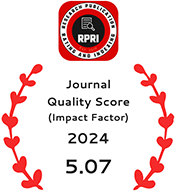Examining the Impact of Climate Change on Agriculture Products in the Province of Jawzjan (Case Study: Certain Villages in Sheberghan City)
DOI:
https://doi.org/10.55544/jrasb.3.5.6Keywords:
Products, Agriculture, Climate, TechnologyAbstract
A region's weather and climate patterns are impacted by climate change over an extended period of time. Rising temperatures, altered precipitation patterns, rising sea levels and other modifications to meteorological conditions are some of these changes. Numerous facets of existence, including the environment, economy, and human communities, may be significantly impacted by climate change. Significant repercussions of climate change are possible, particularly in the agricultural sector. The production of food crops may be impacted by these changes because agricultural goods are dependent on local climate and weather. Pests and plant diseases may also become more prevalent due to climate change. Accordingly, higher temperatures and changed precipitation patterns can foster the growth of pests and illnesses, which will lower agricultural yields. Investigating how climate change affects agricultural products in Sheberghan City, Jawzjan Province, is the goal of this study. A questionnaire was used in fieldwork to perform this study. Six communities inside Sheberghan City—Toka, Qowchin, Jalalabad, Seshanba, Nokar Abad, and Afghan Tapa—were given 100 questionnaires in all. Four different types of questionnaires were produced and designed for the survey portion of this study. Of the 100 responders, 26 worked as farmers, 37 as gardeners, 8 as teachers, and 29 as traders in agricultural products. Using the SPSS26 program, the research was analyzed. The results showed that agricultural goods are significantly impacted by climate change, highlighting the significance of agriculture and agricultural products in the economy. The research findings indicate that the utilization of contemporary technology, such as smart irrigation systems and smart systems, can be one of the elements in growing agricultural products, and that the development of climate-adaptive agricultural methods can boost agricultural products. Farmers' interest can also be raised by government encouragement and assistance. The general conclusion that can be drawn from looking at the aforementioned elements is that agricultural products have been impacted by climate change and the creation of farmers' techniques for adapting to it.
Downloads
References
Ebrahimi, Hossein. (2013). Evaluation of Climatic Conditions and Its Effects on Wheat Crop Calendar in Mashhad. Journal of Modern Agricultural Findings, 7(4), 339-354.
Eskandari, Mohammad Reza. (2007). Role of Climate in Agricultural Planning in Ramhormoz County for Increasing Agricultural Productions with Emphasis on Wheat Crop. Master's Thesis in Climatology. Faculty of Geography Sciences, Islamic Azad University, Ahvaz Branch.
Faiz, Mohammad Wali. (2016). Fundamentals of Agricultural Economics. Kabul: Afghanistan Times Publishing.
Haji Hassani, Abbas; Zend Rezmi, Ali Asghar; & Fardoust Zadeh, Mehdi. (2012). General Agriculture and Gardening. Tehran: Danesh Pejouh.
Jahantigh. (2016). Analysis of the Effects of Crop Calendar on Wheat Water Requirements in Sistan and Baluchestan Province under Climate Change Conditions. Journal of Irrigation and Drainage Engineering, 10(4), 489-498.
Jawzjan Province Profile (Vision of Economic and Social Development of Jawzjan Province). (2020). Jawzjan Economic Directorate Publication.
Khajehpour, Mohammad Reza. (1997). Principles and Fundamentals of Agriculture. Isfahan: Isfahan University of Technology Publications.
Kokic P., Heaney A., Pechey L., Crimp S., & Fisher B. S. (2005). Predicting the Impacts on Agriculture: A Case Study. Climate Change, 12, 12-28.
-Ortiz R., Sayre K. D., Govaerts B., Gupta R., Subbarao G. V., Ban T., Hodson D., Dixon J., Ortiz-Monasterio J., & Reynolds M. (2008). Climate Change: Can Wheat Beat the Heat? Agriculture, Ecosystems and Environment, 126, 46-58.
Muchena, P. and Iglesias, A. 1995. Vulnerability of maize yields to climate change in different farming sectors in Zimbabwe. In Rosenzweig, C. (ED), Climate change and agriculture: Analysis of potential international impacts, pp 229-239.
Nassiri, M. and Koochaki, A. 2007. Adapting dryland wheat production systems of Iran to climate change. Farming System Design 2007: An International Symposium on Methodologies for Intergrated Analysis of Farm Production System, Italy-Catania. Sicily, pp: 52-54.
Nassiri, M., Koochaki, A., Kamali, G. A. and Shahandeh, H. 2006. Potential impact of climate change on rainfed wheat production in Iran. Archives of Agronimy and Soil Science 52: 113-124.
Obsi, G. O. P. 2000. The Impact of Climate Change on Socio-economic Development in the Third World, Lecture presented at 12PthP General Meeting of the Third World Academy of Science (TWAS), 23 October 2001, Tehran, I.R. Iran.
. Pimentel, D. 1993. Climate change and food supplay. FO/11171 fpr Applied Research and Public Policy 8: 54-60.
Ramanathan, V. 1988. The greenhouse theory of climate change: a test by an inadvertent global experiment. Science 240:293-299.
Rasco, P., Szeidl, L. and Semenov, M. A. 1991. A serial approach to local stochastic models. J. Ecological Modeling 57, 27-41.
Rosenzweig, C. and Tubiello, E. N. 1997. Impacts of future climate change on Mediterranean agriculture Current methodologies and future directions.
Ozdogan M. (2011). Modeling the Impacts of Climate Change on Wheat Yields in Northwestern Turkey. Agriculture, Ecosystems & Environment, 141, 1-12.
Semenov, M. A. and Barrow, E. M. 2002. LARS-WG a stochastic weather generator for use in climate impact studies. UserP.Ps manual, Version 3.0.
Shokat Fadaii, Mohsen & Korkinejad, Zhale. (2010). Agricultural Economics. Tehran: Payam Noor University.
Xue, Q, Weiss, A. and Baenziger, P. S. 2004. Predicting leaf appearance in field- grown winter wheat: evaluating liner and non-liner models. Ecological Modelling. 175: 261-270.Banus, Philippines. P: 83.
Downloads
Published
How to Cite
Issue
Section
License
Copyright (c) 2024 Mohammad Ayoob MAKHDOM, Ahmad Kanishka ZOHOR, Aburaihan INTEZAR

This work is licensed under a Creative Commons Attribution-NonCommercial-NoDerivatives 4.0 International License.


















